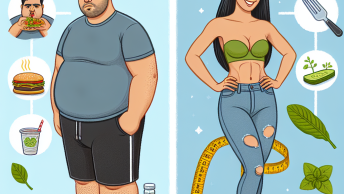In the world of fitness and health, the terms “fat loss” and “weight loss” are often used interchangeably. However, they are fundamentally different concepts that can have significantly different implications for your health and fitness journey. Whether you are trying to shed a few pounds, tone your body, or improve your overall well-being, it’s essential to understand the nuances between the two. Here are the critical differences you need to know.
1. Defining Weight Loss
Weight loss is a broad term that refers to a decrease in overall body weight. This reduction can come from various sources, including water weight, muscle mass, and fat.
Factors Contributing to Weight Loss
- Fluid Loss: A quick drop in weight can often be attributed to dehydration or loss of water weight, especially with fad diets.
- Muscle Loss: Inadequate nutrition or extreme caloric deficits can lead to muscle loss, which can slow down your metabolism in the long run.
- Fat Loss: Ideally, weight loss should primarily come from fat loss, but this isn’t always the case.
2. Defining Fat Loss
Fat loss specifically refers to the reduction of adipose (fat) tissue in the body. Losing fat is more desirable and beneficial than simply shedding weight, as it ensures a healthier body composition.
Benefits of Fat Loss
- Improved Metabolism: Muscle tissue burns more calories than fat tissue, so preserving muscle while losing fat can help maintain metabolic rates.
- Better Health Markers: Reducing body fat percentage can lead to improved cholesterol levels, blood pressure, and blood sugar control.
3. The Importance of Body Composition
Understanding body composition is crucial in distinguishing between fat loss and weight loss. Body composition refers to the ratio of fat to lean mass in your body.
Why Body Composition Matters
- Health vs. Aesthetics: Two individuals can weigh the same but have vastly different body compositions. A person with more muscle mass will look leaner and have better health markers than someone with a higher fat percentage.
- Performance: Athletes often focus on fat loss to improve performance while maintaining or increasing muscle mass.
4. The Scale Can Be Deceptive
Many people rely on the scale as the primary measure of progress, but this can be misleading when assessing fat loss vs. weight loss.
Caveats of the Scale
- Temporary Fluctuations: Weight can fluctuate daily based on hydration, food intake, and other factors.
- Muscle Growth: Gaining muscle while losing fat may not reflect on the scale, leading to potential discouragement.
5. The Diet Dilemma
When it comes to achieving fat loss, nutrition plays a vital role, and the approach often differs from traditional weight-loss diets.
Key Nutrition Strategies
- Focus on Quality: Whole, nutrient-dense foods help promote fat loss while preserving muscle mass, compared to calorie-reduced diets that can lead to muscle loss.
- Macronutrient Balance: Ensuring a proper balance of proteins, fats, and carbohydrates is crucial for maintaining energy levels and metabolism.
If you’re looking for a comprehensive guide to get started on your fat loss journey, Click Here to learn more.
6. Exercise Considerations
While both weight loss and fat loss can be influenced by exercise, the types of exercises that are most effective differ based on your goals.
Recommended Exercise Types
- Strength Training: Ideal for fat loss, as it helps build and preserve muscle, subsequently increasing the basal metabolic rate.
- Cardiovascular Exercise: Useful for overall weight loss, but should be balanced with strength training to avoid muscle loss.
7. Set Sustainable Goals
When striving for fat loss, setting realistic and sustainable goals can lead to long-term success, unlike quick fixes that result in temporary weight loss.
Tips for Goal Setting
- Focus on Inches, Not Just Pounds: Pay attention to how your clothes fit and how you feel, rather than strictly numbers on the scale.
- Set Performance Goals: Instead of only aesthetic goals, aim for performance-related achievements, such as completing a race or lifting a specific weight.
8. The Role of Hormones
Hormones can significantly affect both fat loss and weight loss. Understanding how they impact your body can empower you to make better health choices.
Key Hormones Involved
- Insulin: Regulates carbohydrate metabolism and fat storage. Managing insulin through diet can help with fat loss.
- Cortisol: Stress hormone that, when elevated, can lead to increased fat storage, particularly around the abdomen.
9. The Psychological Aspect
The mindset around fat loss and weight loss can differ. Understanding and addressing your motivations can ultimately lead to more effective results.
Mental Shifts to Consider
- Focus on Health, Not Numbers: Shift your mindset from focusing purely on weight loss to embracing overall health and well-being.
- Celebrate Non-Scale Victories: Acknowledge progress in endurance, strength, and confidence, rather than simply tracking changes in weight.
10. Seek Professional Guidance
Navigating the complexities of fat loss and weight loss can be challenging alone. Professional help can provide personalized strategies tailored to your specific needs.
Options for Support
- Nutritionists/Dietitians: Professionals who can guide you in formulating personalized nutrition strategies for fat loss.
- Personal Trainers: Experienced trainers can provide personalized workout plans that focus on fat loss while preserving muscle.
Conclusion
Understanding the vital distinctions between fat loss and weight loss can profoundly influence your fitness journey and overall health. Approaching your goals with the right mindset, focusing on muscle preservation, and committing to sustainable habits will lead to the best results. Emphasizing fat loss rather than merely chasing losing pounds can set you on a path to a healthier, more fulfilling lifestyle. Whether it’s adopting a better diet or incorporating effective exercise routines, the journey towards fat loss is ultimately a journey towards better health.
To delve deeper into fat loss techniques and strategies specifically designed to help you, Click Here to learn more and take the first step in your transformative journey!






